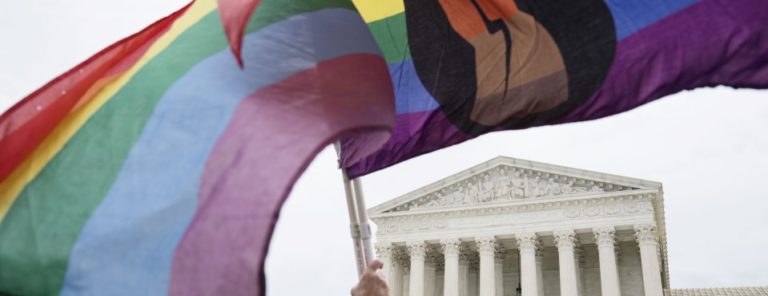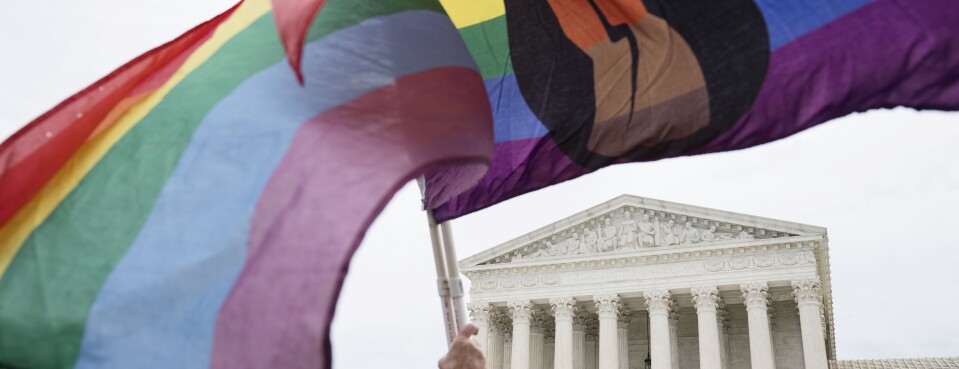

The ongoing debate surrounding religious exemptions to LGBT anti-discrimination laws remains unsettled for workplaces, after the U.S. Supreme Court’s narrow ruling in a same-sex foster parents case sidestepped the clash percolating in courts and Congress.
Thursday’s unanimous decision in Fulton v. Philadelphia found that a city ordinance violated the U.S. Constitution when officials excluded a Catholic charity from part of the city’s foster-care program because the group wouldn’t help place children with same-sex couples.
Attorneys and academics said the ruling fell short of a sweeping re-framing of religious rights under the Constitution, which would have undercut other discrimination statutes such as Title VII of the 1964 Civil Rights Act. The high court held in a landmark decision last year that Title VII protects LGBT workers.
“The immediate impact is fairly muted,” said Anthony Michael Kreis, an assistant law professor at Georgia State University, who focuses on constitutional and employment law. “The bigger fights about religious rights and LGBTQ people have been punted down the road for another day. Those fights will continue.”
The decision focused on the specifics of the Philadelphia ordinance, and left open larger questions about when a “neutral law of general applicability,” such as an anti-discrimination law, will violate the First Amendment’s protections for the free exercise of religion.
This clash between religious rights and anti-bias laws has raged in courts in employment and public accommodations cases, as well as on the Hill where a comprehensive LGBT rights bill known as the Equality Act awaits Senate consideration. There’s some indication that the high court will ultimately answer those broader questions, attorneys and academics say.
Kreis compared Fulton to similar narrow rulings on the issue, including Masterpiece Cakeshop, Ltd. v. Colorado Civil Rights Commission, the 2018 case about a baker who refused to make a cake for a same-sex wedding.
“They took a scalpel to the Philadelphia ordinance,” he said. “It wasn’t the ax that many LGBT groups feared.”
The Becket Fund for Religious Liberty, which brought the case to the Supreme Court, pushed for the court to upend its precedent for when laws clash with religious beliefs, but cheered the decision. In a statement, the nonprofit legal group said the justices “recognized that protecting faith-affirming agencies will ensure foster children in need have every opportunity available to find a loving home.”
Jennifer Pizer, law and policy director for Lambda Legal, said the decision could lead to confusion about when religious groups can discriminate, but added that it at least didn’t limit the government’s power to protect against bias.
“At the same time, we can’t help noticing that we have had a string of decisions in which the court has rejected a broad license to discriminate but has nevertheless found a way to rule on behalf of a religious claimant based on unique facts,” Pizer said.
Litigation Ahead
The foster care case had the potential to have a sweeping effect on government enforcement of anti-bias laws at work and beyond. In addition to Title VII, at least 23 states have specific anti-discrimination protections for LGBT individuals, according to Bloomberg Law.
“This decision will invite a lot more litigation,” said David Flugman, a partner at Selendy & Gay PLLC, who heads up the firm’s diversity and inclusion efforts. “The question now is how will courts deal with analogous factual circumstances as groups push for Free Exercise claims.”
After last year’s Supreme Court decision in Bostock v. Clayton County, GA, the question about religious defenses to workplace discrimination liability was left unaddressed.
“The Bostock decision was landmark, but it left as many questions open as it did closed,” said Michelle Phillips, a principal of Jackson Lewis P.C., who represents and advises employers.
It’s clear the Supreme Court is open to taking up broader questions about religion and other issues, she said.
In Texas, Christian groups are suing the U.S. Equal Employment Opportunity Commission to get a carveout from Title VII’s LGBT anti-discrimination requirements. They’re seeking to represent classes of employers that have religious and non-religious objections to homosexuality or “transgender behavior.”
“Is there a Constitutional right to discriminate that would override Title VII in some context? That remains a question,” said James Esseks, director of the LGBTQ & HIV Project for the American Civil Liberties Union.
Narrow for Now
In Fulton, Catholic Social Services asked the justices to revisit 30-year-old precedent governing religious exemptions from “neutral laws of general applicability” that don’t expressly target religion.
In concurring opinions, several justices noted that they could reconsider its 1990 decision in Employment Division v. Smith, which held that the First Amendment’s free exercise clause doesn’t prohibit states from applying neutral laws of general applicability to bar actions motivated by religion.
That case eventually led to the enactment of the 1993 Religious Freedom Restoration Act, which prohibits the federal government from burdening a person’s free exercise of religion, even if that burden stems from a neutral, generally applicable law.
Religious groups have long pushed to apply a strict test that would require the government to show that a neutral law of general applicability, if it burdens religion at all, is narrowly tailored to a compelling interest. Justices
Justices
Courts have also grappled with whether the Religious Freedom Restoration Act’s exemptions apply to Title VII discrimination claims, which LGBT workers can now file—an issue the Supreme Court could one day take up.
“This is a court that is protective of free exercise of religious liberties,” Selendy & Gay’s Flugman said.